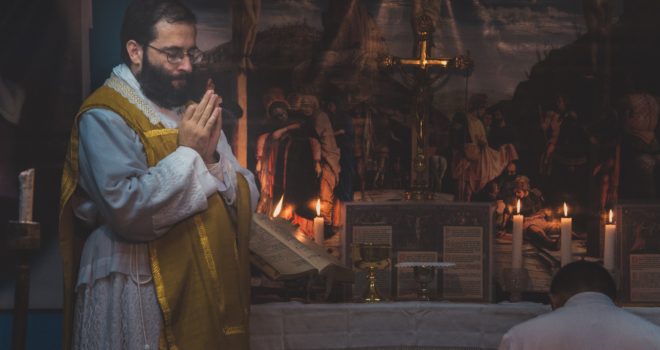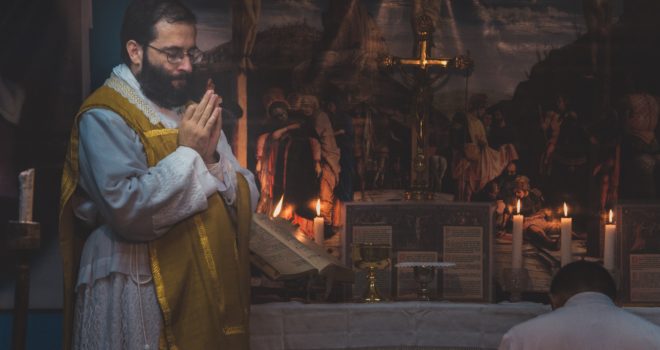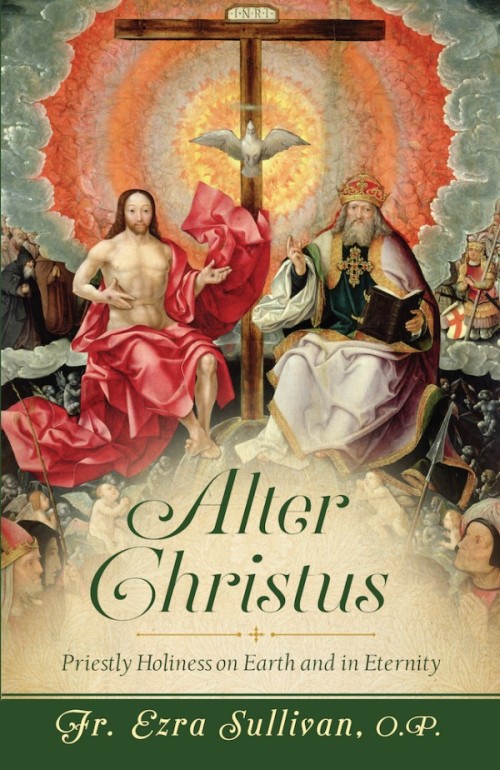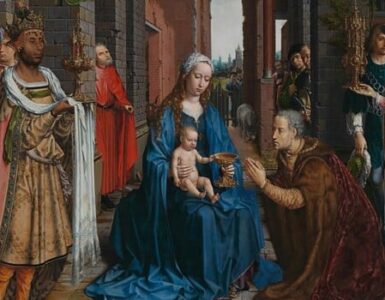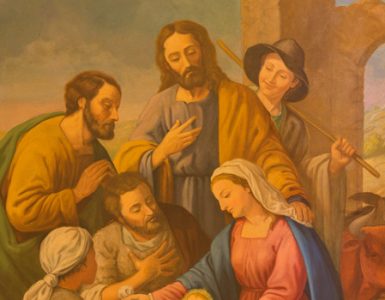From the very beginning of the Church, Christians have recognized that spiritual paternity stems from ordination. At first, this role was recognized in bishops who possess the fullness of Holy Orders, but, in time, it came to be understood as proper to priests also. Pius XII expressed this tradition well, saying, “By his law of celibacy, the priest, so far from losing the gift and duties of fatherhood, rather increases them immeasurably, for, although he does not beget progeny for this passing life of earth, he begets children for that life which is heavenly and eternal.”
Presently, in English, therefore, all ordained priests are called “Father,” although it is different in other languages: in Italian, we call consecrated religious priests Padre and diocesan (i.e., “secular”) priests Don, which may be an abbreviation of Dominus, a reminder of our Lord in Heaven. French speaks of Père for religious priests, but diocesan priests are called Abbé, which is derived ultimately from the Aramaic Abba, a familiar term for “father” such as papa.
Not all are comfortable with recognizing a priest’s spiritual paternity, however. Often when I travel in secular contexts, a clerk at a store or a server at a restaurant will call me “Sir,” a usage of secular formality. Many Protestant apologists voice a common objection to the Catholic priesthood, arguing along the lines of: “Catholics are disobedient to Christ, because He said in Matthew 23:9, ‘Call no man your father on earth, for you have one Father, who is in heaven.’ ” If they want to twist the knife in farther, they would say that the priesthood is a usurpation of the divine prerogative for honor, that calling priests “father” emboldens a man’s pride and places a false hierarchy among the followers of Christ, who are all brothers through Baptism.
As an initial response, we might note that the designation “father” is used by Christ Himself in the parable of the Prodigal Son, who returns home to his father (Luke 15:21), showing the validity of calling a man “father” when he is a progenitor in one’s bloodline, as was the custom of the Jews in that time. The New Testament of Christ goes further: in the parable of the rich man and Lazarus, Jesus depicts the rich man as suffering in the fires of Hell and crying out to “Father Abraham” three times (Luke 16:24, 27, 30). Christ may be hinting that there can be spiritual
fatherhood beyond that of the biological realm.
Spiritual fatherhood was more fully revealed in the finding of Jesus in the Temple. In that moment, Mary spoke to her son about Joseph, saying, “Behold, your father and I have been looking for you anxiously” (Luke 2:48). Referring to this reality, John Paul II teaches,
In the Incarnation, one finds a true fatherhood: the human form of the family of the Son of God, a true human family, formed by the divine mystery. In this family, Joseph is the father: his fatherhood is not one that derives from begetting offspring; but neither is it an “apparent” or merely “substitute” fatherhood. Rather, it is one that fully shares in authentic human fatherhood and the mission of a father in the family. This is a consequence of the hypostatic union: humanity taken up into the unity of the Divine Person of the Word-Son, Jesus Christ.
St. Joseph therefore was an earthly father that stood in place of God the Heavenly Father, caring for the eternal Son of God as his own by adoption in order that Christ might be made available to the world. Leo XII explains:
The Blessed Patriarch looks upon the multitude of Christians who make up the Church as confided specially to his trust…. Because he is the spouse of Mary and the [adoptive] Father of Jesus Christ he holds, as it were, a paternal authority. It is, then, natural and worthy that as the Blessed Joseph ministered to all the needs of the family at Nazareth and girt it about with his protection, he should now cover with the cloak of his heavenly patronage and defend the Church of Jesus Christ.
St. Joseph’s spiritual paternity is confirmed by the spiritual maternity of Mary: just as she is the spiritual mother of all who live in Christ, that is, in His Mystical Body the Church, so Joseph is a spiritual father to all who live in Christ, and he is therefore universal patron of the Church.
Furthermore, St. Paul explained his own mission to the Christians in Corinth in terms of his spiritual paternity as an apostle chosen by Christ:
I do not write this to make you ashamed, but to admonish you as my beloved children. For though you have countless guides in Christ, you do not have many fathers. For I became your father in Christ Jesus through the gospel. I urge you, then, be imitators of me (1 Cor. 4:14–16).
Notice that St. Paul exhorts Christians to imitate him as their “father in Christ”: by doing so, they would be conformed to him. In this way, St. Paul becomes a new Abraham, a “father in faith”—and all bishops and priests ordained like the apostle are called to imitate God the Father with spiritual paternity for the baptized. God is truly and perfectly “Father” because, in His divine fruitfulness, He gives Himself so completely to the Son in generation that the Son bears a perfect resemblance of the Father, being all that the Father is, except origin: the Son perfectly has the nature of the Father as His Word, Image, Wisdom, and Power. The Father then sent the Son into the world that the Son might take flesh and, through the work of redemption, restore the likeness of the Holy Trinity in souls. Through the divinizing action of grace, “in literal truth, and not by simple analogy or resemblance, we call the Father of the Word our Father. . . . We are in some sense one single son of the Father in the [divine] Son and with the Son.”
John Paul II has said that all males are called to reveal and live on earth the very fatherhood of God. Priests are called to do this in a particular way. The God-given vocation of priests is to perform the work of the Father, for they are called to beget the divine life of Christ in souls through the priceless and sacred treasure that they have been given: “The very pure fruitfulness of the Father … makes them, in turn, fathers of souls.” Ven. Conchita explains, “Their fruitfulness in souls ought to be the same fruitfulness of the Father with which he begot the Word, with the holy and virginal fruitfulness of the Holy Spirit that produced the Word made flesh in Mary.” That is to say, “Priests are the bond of union that unites Christians with Christ, and they are fathers who represent the Father, in order to
bring about the extension of the Word in souls,” so that the Father “can bring about the ideal He had when He formed man: to see in man the countenance of His word and the reflection of the Trinity.”
Speaking of the “inexpressibly sublime” role of priests and the “incomprehensible fruitfulness” of the Church, Matthias Scheeben expresses the same truth, saying, “The activity of the priesthood in
the Church … amounts to this: to fashion Christ in its members, to unite them to Christ, to conform them to Him, to build up to the full measure the stature of Christ.”
Because of the power of spiritual paternity given in the Sacrament of Holy Orders, a priest has an unparalleled dignity among creatures. There might be two hundred angels in a church, but they could not absolve you. On your deathbed, when you invoke St. Michael, the holy archangel can chase away demons. But if you are in mortal sin, he cannot free you from devilish chains until a priest absolves you. Thus, St. John Vianney and St. Alphonsus argue that “the sacerdotal dignity . . . surpasses the dignity of angels.” It is said that St. Francis of Assisi remarked, “If I saw an angel and a priest, I would bend my knee first to the priest and then to the angel.”
Perhaps even more astounding, for all the criticisms he has received for his grandiose language about the importance of Mary, the Mother of God, St. Alphonsus insists, “The power of the priest surpasses that of the Blessed Virgin Mary; for, although this divine Mother can pray for us and by her prayers obtain whatever she wishes, yet she cannot absolve a Christian from even the smallest sin.” Furthermore, Mary conceived the Son of God in her womb only once, “but in consecrating the Eucharist,” St. Alphonsus says, “the priest, as it were, conceives him as often as he wishes.” In this way, the priest is like God the Father, for as the Father eternally begets the Son in Divine Being, so the priest temporally gives Christ a sacramental existence. Thus, the priest is truly a spiritual father, bringing Christ into the world as an extension of God the Father’s act of sending the Son for the redemption of mankind.
✠
Editor’s note: the above excerpt is adapted from Alter Christus: Priestly Holiness on Earth and in Eternity, available now from Sophia Institute Press.
Photo by Ramses Sudiang on Unsplash


